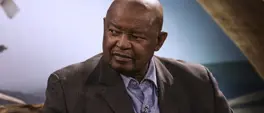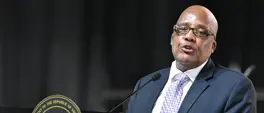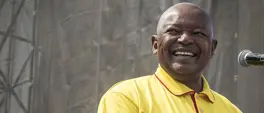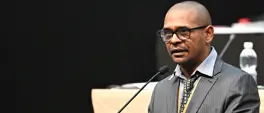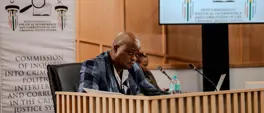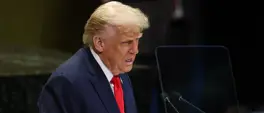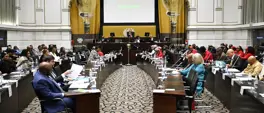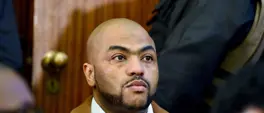CHARLES MATSEKE | Malema's guilty verdict: Political earthquake or revolutionary rebirth?
Charles Matseke
2 October 2025 | 16:30"If Julius Malema falls, the party may crumble. If he survives, his struggle may yet transform this guilty verdict into the fuel of a new revolutionary fire."
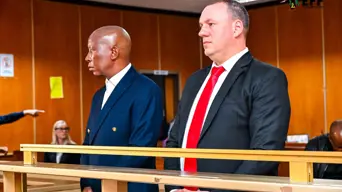
Economic Freedom Fighters (EFF) leader Julius Malema appears at the East London Magistrates Court alongside Adriaan Snyman on Monday, 21 July 2025. Picture: X/@EFFSouthAfrica
The guilty verdict handed down against Economic Freedom Fighters (EFF) leader Julius Malema for contravening the Firearms Control Act is more than a legal matter.
It is a political earthquake with implications that stretch from the corridors of the judiciary to the streets where his red-beret supporters march.
For Malema, a man who has styled himself as a revolutionary, the courtroom has become the battlefield. For his enemies, such as AfriForum, Stellenbosch elites, corporate conglomerates like Steinhoff, and white monopoly capital more broadly, this may be their most opportune moment to cut him down to size.
Malema was found guilty on five counts under the Firearms Control Act, including the unlawful possession and discharge of an automatic rifle. A crime that carries a maximum sentence of 15 years imprisonment. Procedurally, sentencing is expected on 23 January 2026, and while there is no strict regulation on how long a judge may delay, the drawn-out process already signals the high-stakes nature of this case.
The judgment was marked by sharp criticismof Malema’s courtroom demeanor. The judge cited his lack of remorse and confrontational answers during cross-examination as evidence of “recklessness” unbefitting a political leader with a mass following. This suggests that, beyond the legal merits, Malema’s personality and posture in court may weigh heavily against him in sentencing.
This is not unprecedented. Judges have historically invoked “character and conduct” to aggravate sentences, most infamously in the cases of former President Jacob Zuma, who repeatedly framed his own trials as political persecution.
The same judicial skepticism may now be turned against Malema.
One fact must be clear, what Malema did was wrong. Discharging a firearm in public, especially at a rally, was reckless, unlawful, and endangered lives. A leader of his stature should have known better. This point cannot be glossed over, even as we recognize the political undertones of the trial.
The EFF has always been more than a party; it has been a personality cult built around JuliusMalema. His charisma, fiery rhetoric, and defiance have been the glue binding the movement. But with the departure of key figures such as Floyd Shivambu, Dali Mpofu, and Dr Mbuyiseni Ndlozi, the organization looks hollowed out.
The guilty verdict throws the party into an existential crisis: Can a one-man party survive without its one man?
This is especially urgent with the Local Government Elections next year and the 2029 General Elections on the horizon. Malema’s possible imprisonment, particularly if it exceeds 12 months, which would constitutionally disqualify him from Parliament under Section 47(1)(e) could cripple the EFF’s institutional capacity.
Yet, what looks like political death may also be rebirth. Malema can turn this guilty verdict into a political weapon, much as Zuma did during his years of court battles.
Malema can argue this is not about guns, but about silencing the land question, the issue white monopoly capital fears most.
Eachsentencing hearing and appeal can be staged as a mass mobilisation. Thousands of red berets outside courtrooms transform legal proceedings into political theatre.
Instead of saying simply “witch-hunt,” Malema can argue: “They jail me for a gun because they fear debating land. The courts are the new weapon of colonial suppression.”
Courts are already distrusted in townships and rural communities as elitist institutions. Malema can say: “My persecution is your persecution, when you fight for land or survival, you face the same judge, the same prison, the same law.”
This strategy would resonate strongly with the poor and working-class base that sees the judiciary as protecting privilege, elitism and private property rights.
Malema has consistently challenged what South Africa’s ruling class has guarded most zealously: private property rights. For years, he has warned that land dispossession is the original sin that must be corrected. That very defiance may now see him traded from Parliament benches for a prison cell.
Whether he emerges weakened or renewed will depend on his ability to weaponize victimhood and galvanize his followers.
One truth is inescapable: the EFF's future hangs not on its ideology, but on the fate of one man. If Julius Malema falls, the party may crumble. If he survives, his struggle may yet transform this guilty verdict into the fuel of a new revolutionary fire.
Charles Matseke (MPhil in Politics and International Relations) is a researcher and writer with a keen interest in contemporary political dynamics. His research focuses on electoral politics, foreign policy analysis, and international relations, with a particular emphasis on the Global South and Africa's role in global affairs.
Get the whole picture 💡
Take a look at the topic timeline for all related articles.
Trending News
More in Opinion
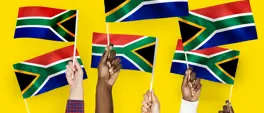
3 March 2026 11:40
Who belongs in South Africa? UCT philosopher weighs in on identity and ownership

2 March 2026 11:05
TLALI TLALI |Mandate, money and accountability - What the government website debate really reveals

27 February 2026 11:00
JAMIL F. KHAN | Human rights last on the list for global leadership agenda
